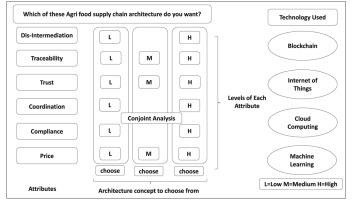Journal of Cleaner Production ( IF 11.1 ) Pub Date : 2020-10-20 , DOI: 10.1016/j.jclepro.2020.124731 Samant Saurabh , Kushankur Dey

|
The emerging Information and Communication Technology plays a vital role in electronic agriculture. The application of such technologies as blockchain, Internet-of-Things, wireless sensor networks, cloud computing, and machine learning can improve the agri-food supply chain efficiency and quality management. However, there is little evidence on the determinants of blockchain integrated ICTs adoption for the supply chain actors and their propensity to embrace and use such technologies. To bridge this research gap in the literature, we identify a few potential drivers of blockchain technology adoption, considering the grape wine supply chain and employing a rating-based conjoint analysis. The study finds that dis-intermediation, traceability, price, trust, compliance, and coordination and control in order of their relative importance and utilities can influence the supply chain actors’ adoption-intention decision processes. The adoption factors further rationalize the design for a modular, scalable, interoperable, and cost-effective architecture for supply chain integration and sustainability.
中文翻译:

区块链技术的采用,架构和可持续农业食品供应链
新兴的信息和通信技术在电子农业中起着至关重要的作用。区块链,物联网,无线传感器网络,云计算和机器学习等技术的应用可以提高农业食品供应链的效率和质量管理。但是,关于供应链参与者采用区块链集成ICT的决定因素及其采用和使用此类技术的倾向的证据很少。为了弥补文献中的这一研究空白,我们考虑了葡萄酒供应链并采用基于评级的联合分析,确定了区块链技术采用的一些潜在驱动因素。研究发现,非中介,可追溯性,价格,信任,合规性,以及按其相对重要性和效用进行的协调和控制会影响供应链参与者的采用意图决策过程。采用因素进一步简化了用于供应链集成和可持续性的模块化,可扩展,可互操作且具有成本效益的体系结构的设计。


























 京公网安备 11010802027423号
京公网安备 11010802027423号